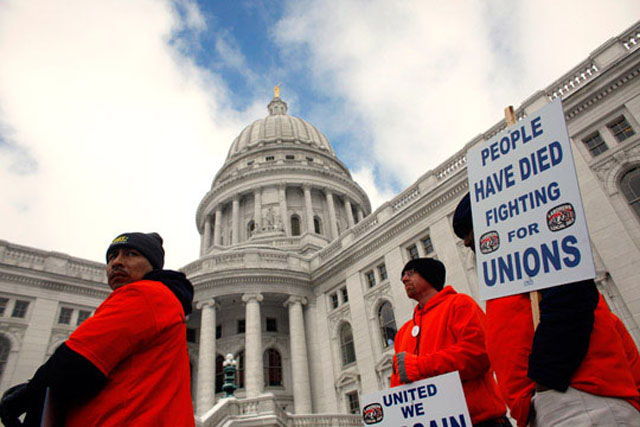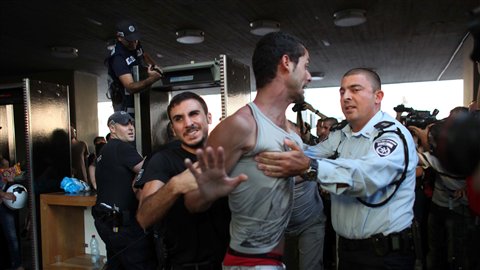Le Industrial Worker d’octobre est en ligne | October IW journal is online Issue #1739
[scribd id=67067758 key=key-17e66rykmgfou0ko9nl1 mode=list]

[scribd id=67067758 key=key-17e66rykmgfou0ko9nl1 mode=list]
NewYork IWW General Membership Branch
Disclaimer: The following was issued by Noam Chomsky (a dues paying memebr of the IWW) as an individual and not on behalf of the IWW. It is posted here for informational purposes only:
 Anyone with eyes open knows that the gangsterism of Wall Street — financial institutions generally — has caused severe damage to the people of the United States (and the world). And should also know that it has been doing so increasingly for over 30 years, as their power in the economy has radically increased, and with it their political power. That has set in motion a vicious cycle that has concentrated immense wealth, and with it political power, in a tiny sector of the population, a fraction of 1%, while the rest increasingly become what is sometimes called “a precariat” — seeking to survive in a precarious existence. They also carry out these ugly activities with almost complete impunity — not only too big to fail, but also “too big to jail.”
Anyone with eyes open knows that the gangsterism of Wall Street — financial institutions generally — has caused severe damage to the people of the United States (and the world). And should also know that it has been doing so increasingly for over 30 years, as their power in the economy has radically increased, and with it their political power. That has set in motion a vicious cycle that has concentrated immense wealth, and with it political power, in a tiny sector of the population, a fraction of 1%, while the rest increasingly become what is sometimes called “a precariat” — seeking to survive in a precarious existence. They also carry out these ugly activities with almost complete impunity — not only too big to fail, but also “too big to jail.”
The courageous and honorable protests underway in Wall Street should serve to bring this calamity to public attention, and to lead to dedicated efforts to overcome it and set the society on a more healthy course.
Noam Chomsky

For one thing, the events in Wisconsin, Ohio, and elsewhere are only local manifestations of a general, worldwide trend towards austerity budgets and the weakening of union power, a trend underway since the 1980s. Moreover, both the rise and the current decline of public-sector unions, like those of private-sector unions, represent processes in which the state has played a major part. […]
Large numbers of workers in Wisconsin embraced the idea of a general strike as a countermeasure to the state government’s union-busting bill. The 97-union South Central Federation of Labor, representing 45,000 Wisconsin workers, voted in favor of such an action, and there were enthusiastic cries of “general strike” from the crowd that invaded the Capitol in protest. In the event, however, nothing actually happened. Union leaders discouraged immediate action, warning that public employee strikes are illegal and that workers risked losing their jobs—fears that the rank-and-file seem to have widely shared. Many teachers spontaneously called in sick but were urged by their union president to go back to work; similarly, when teachers actually walked off the job in the city of Sun Prairie, their union leader, explaining it as the result of the fact that “people are upset,” said he hoped it doesn’t happen again. Instead of striving to spread such actions and create the conditions for a wide-scale demonstration of workers’ indispensability to the daily existence of society, labor organizations directed their members into attempts to recall Republican legislators and the campaign to elect a Democratic replacement for anti-union state Supreme Court justice David Prosser, in a race that in the end Prosser won handily.
As long as workers can think of no way to contest the erosion of their standard of existence other than voting every few years or paying union officials to speak for them, that erosion will continue. Wisconsin’s strike fever suggests that as conditions continue to worsen it may well occur to workers, both public and private, that their social power lies not in the institutions of the capitalist labor market, including the declining unions, but in their own position as collective producers of everything that makes life possible.
[English Follows] Source: Syndicat CNT 34 éducation

Soutenons Giorgos le 22 Septembre – Contre la répression la solidarité est notre arme
[scribd id=63726259 key=key-1zkhj3e2h684i9vesyu3 mode=list]
Télécharger en PDF — Telecargar el PDF — Download PDF format

If workers want to survive these attacks, we need to re-learn how to organize and fight on the shop floors and build strong rank and file networks of union and community activists that span different workplaces and sectors. Without a militant base, there is little hope that a general strike would be anything more than “a good show” —as former Ontario Premier Mike Harris referred to the tens of thousands of workers that marched past the Tory convention during the Toronto “days of action” in the mid-1990s.
This past year has witnessed a renewed assault on unionized workers that should be seen for what it is: a co-ordinated attack on the right of workers to collectively bargain with their employers.
One of the opening salvos in this new wave of class warfare occurred immediately after the far-right ideologue Rob Ford was elected Mayor of Toronto on a platform of “stopping the gravy train”—none-too-subtle code words for attacking public sector workers and the services they provide.

Une quarantaine de manifestants ont été arrêtés à Tel-Aviv, mercredi, sur deux sites de campement établis dans la foulée du mouvement de contestation populaire contre les injustices socio-économiques.
Il s’agit de la première vague d’arrestations en Israël depuis le début de la mobilisation, il y a environ neuf semaines.
Les manifestants avaient bloqué la circulation sur une avenue centrale et ils avaient pénétré de force dans la mairie après le démantèlement de quelques tentes par les services municipaux.
Les autorités israéliennes ont assuré avoir démantelé des tentes qui avaient été abandonnées par les manifestants et qui « posaient un risque sanitaire ».
 |
| Photo: AFP/JACK GUEZ
La contestation s’exprime dans plusieurs villes du pays. Des inspecteurs municipaux accompagnés par les forces de police ont aussi démantelé des structures de bois bâties par des manifestants dans la ville de Holon, au sud de Tel-Aviv. |
Le mouvement de contestation, inspiré de celui des indignés en Espagne, dénonce la hausse du coût de la vie en Israël, où les disparités économiques sont importantes malgré une bonne performance économique du pays. Le mouvement a débuté en juillet, et les manifestations se sont intensifiées au cours des semaines.
Le gouvernement de Benyamin Nétanyahou est ainsi confronté à la plus grave crise intérieure qu’Israël ait connue.
Les porte-parole du mouvement réclament moins d’investissements dans l’armée et dans la colonisation, et davantage dans les programmes sociaux, l’éducation, la santé, et les logements sociaux. Ils veulent aussi que le gouvernement concentre ses ressources sur des investissements dans les terres à l’intérieur des frontières d’Israël, ce qu’ils nomment les « terres sûres ».
Samedi dernier, le pays a connu la plus grande manifestation de son histoire, lorsque 400 000 Israéliens sont descendus dans les rues d’une quinzaine de localités pour réclamer des réformes.
Ce texte est une réponse à l’éditorial d’Éric Duhaime “Écoeuré des Syndicat“

eric.grenier – 6 septembre 2011 Jobboomblog.com
Le titre de ce monologue anthologique d’Yvon Deschamps aurait pu tout aussi bien coiffer le sondage dont le collègue Duhaime fait part (Écoeuré des syndicats), dans sa chronique de ce matin au Journal de Québec. D’abord, pour ceux qui lui posaient la question dans la section commentaires de son blogue, le sondage vient d’une organisation du nom d’Infotravail. Comme ça se comprend, InfoTravail est une organisation patronale, dont la mission est de vendre le point de vue patronal aux travailleurs. Ce n’est pas écrit comme ça dans leur énoncé de mission, j’en conviens, mais bon, sous le principe que ça marche comme un canard, ça vole comme un canard, ça pond comme un canard, ça caquette «coin-coin» comme un canard, et ça vole comme un canard, c’est donc tout comme un canard. Lire la suite →
